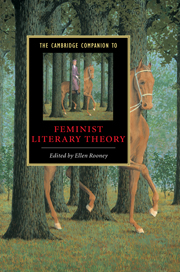 One of the projects I'm attempting to work on involves feminist theory. I'm reading parts of The Cambridge Companion to Feminist Theory, in order to educate myself about the issues. My hope is, after I finish this, I'll be able to move into reading selections of the theory itself, having the kind of background knowledge to make more sense of each individual work within a wider context. Even though I've taken classes on feminism and women in literature and read feminist blogs, I still feel like furthering my understanding of things is a worthy goal.
One of the projects I'm attempting to work on involves feminist theory. I'm reading parts of The Cambridge Companion to Feminist Theory, in order to educate myself about the issues. My hope is, after I finish this, I'll be able to move into reading selections of the theory itself, having the kind of background knowledge to make more sense of each individual work within a wider context. Even though I've taken classes on feminism and women in literature and read feminist blogs, I still feel like furthering my understanding of things is a worthy goal.Working through the introduction, I stumbled upon an idea that I had never considered before, but it seems basic and obvious now. There was a short discussion about the effect of reading on women. One of the ideas surrounding reading is that it made women more likely to question the status quo. As someone who loves to read and thinks of herself as a questioner of the status quo, I obviously like this idea.
I was in that shaky area of brain space between wakefulness and sleep this morning, when I stumbled upon a refutation of that idea: Mr. Darcy Takes a Wife and Darcy and Elizabeth.
Some background: both of these books are part of a phenomenon within the Jane Austen fandom, where writers publish what are basically works of fanfiction, usually centering on the marital (bliss?) of Darcy and Elizabeth. I find these works interesting for several reasons, but I want to focus on one of the least discussed characters: Anne de Bourgh. Within these two works, Anne is shown reading books, and not just any books: Gothic romances, the kind of thing that feminists have long championed (like in the cult following around Jane Eyre). But in the novels, Anne is forced into a marriage by her mother, and her husband uses his marriage to her for his own financial gain. Anne dies in the second book after giving birth to a child, no one mourning in the least for her. She never escapes her abusive mother or negligent husband to live independently, as her own person.
This is problematic. At one glance, this could be interpreted as Berdoll, the author, criticizing Gothic romances for not really being as feminist as some say they are. I've often argued that point with Jane Eyre, complaining that for a so-called feminist novel, our heroine ends up with a guy who tricked, lied and manipulated her. But this could also be seen as a criticism of the idea that women who read are automatically going to be feminists.
There's a lot of proof, even in my personal life, of this. I have a few self-identified feminist friends who say things that are anything but feminist. ("Oh, well, that girl is exaggerating. She probably just wishes he was stalking her.") They have college educations, they read, and yet they're totally for the status quo. There are a ton of so-called feminists who love their white privilege and refuse to see that in furthering a "feminism" that is limited to white women, they are just furthering the same oppressive system. I've been frustrated on quite a few occasions by this.
So, does reading make a difference? It doesn't hurt. Women who read reap the normal benefits of reading: mental exercise, better sense of language, exposure to well-constructed arguments and varied points of view. Because of this, women are more likely to see the ways in which systems of oppression operate, and through that knowledge, work to bring them down.
I myself am proof that it makes a difference, since I began this project in an attempt to understand more about the world around me, and even though I wasn't even through the introduction of the book I'm reading, I've already found myself considering ideas inter-textually and constructing an argument about the validity of an argument. So sure, women read. Feminists question power and argue for greater inclusion.
No comments:
Post a Comment